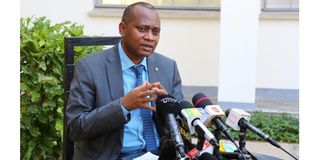Economists: Invest more to make UHC sustainable

Health ministry’s permanent secretary Abel Makubi addresses a press conference in Dodoma at a past event. PHOTO | FILE
What you need to know:
- Tanzania is pushing for the universal healthcare coverage and already member contribution rates have been made public, economists question the viability of the model chosen
Dar es Salaam. Towards the establishment of the Universal Health Coverage (UHC) in Tanzania, economists have reacted showing they are not sure whether the proposed model would be sustainable.
They, however, urged the government to invest more in the sector if the country is to achieve decent healthcare services for all.
On Friday, Prof Abel Makubi, who is the permanent secretary for the Ministry of Health, said the UHC proposed model made it that a household of six would be required to contribute Sh340,000 annually; while an individual would pay Sh84,000.
But, yesterday, Prof Abel Kinyondo of the University of Dar es Salaam (UDSM) noted that the logic behind establishing the UHC would determine the model’s sustainability.
“Usually, health insurances tend to limit the size of beneficiaries, in relation to their age, prior health conditioning; the system favours the productive personnel as they are youthful and healthier,” he explained.
He added: “With such logic, it means that the healthful person’s contributions cater for unhealthy people, and since people are likely to subscribe to insurance when there is a need, then private insurers tend to impose limitations but with universal coverage such advantage is omitted.”
The associate professor in the department of Economics and Geography, was of the view that if the said coverage would solely depend on the member contributions, then; its sustainability would be questionable.
“Otherwise, their coverage should be only for let say, malaria, urinary tract infection (UTI) and the likes which in fact would be unsatisfactory and people would see no need to have such healthcare coverage,” he said.
However, the don applauded government initiative saying: “It’s a good thing but not sustainable if the logic is to only utilise its contribution as main cover, so the government needs to invest more cash.”
The World Health Organisation (WHO) says UHC means individuals receive health services they need without suffering financial hardship.
This includes the full spectrum of essential, quality health services, from health promotion to prevention, treatment, rehabilitation, and palliative care across the life course.
For his part, Prof Haji Semboja, a senior lecturer at the University of Zanzibar (UZ), was of the view that since every country has its own economy which determines the way to finance its UHC, then Tanzania needs to utilise its natural resources to fund the matter.
“I’m not sure about the mathematics behind the model, as I’m not aware of the way it was calculated. I consider Tanzania as a transitional economy, I might differ from others but let’s start with what has been tabled,” he observed.
According to him, the government must define its own approach to financing the UHC given its unique context and starting point as well as positively subscribing to global health issues as Tanzania isn’t an island.
“Health is a global issue, and since the country’s health sector is a major recipient when it comes to donor funds, then we should engage them, we should have health policies that interlinks with those of WHO, and other bilateral partners,” Prof Semboja noted.
Moreover, Prof Semboja said a long term solution would be changing the country’s perceptions on relaying on tax funded systems for its development as such will not help the country to provide decent healthcare to its people.
“We need to use our massive natural resources, we shouldn’t only invite investors and wait for taxes, we need to emulate what Norway and Mexico did, let’s own, manage, and operate, then from there, we will have enough for the country’s development,” he said.
Media reports show that only 15 percent of the population are subscribed to health insurance cover, leaving 85 percent of the population depending on their pockets for the said cover which in turn propagates the risk of being pushed into poverty.
Moreover, in August last year, Mr Gerson Msigwa, government spokesperson was quoted as saying, the government has set aside Sh149 billion that would be spent for covering health insurance of 26 percent Tanzanians living below the poverty line.
Commenting on, Ms Neema Mhando, a Dr es Salaam resident said: “I think health financing arrangements is important as it influences UHC sustainability, because what matters is how the coverage affects its beneficiaries, in terms of equity, quality and financial protection for everyone.





